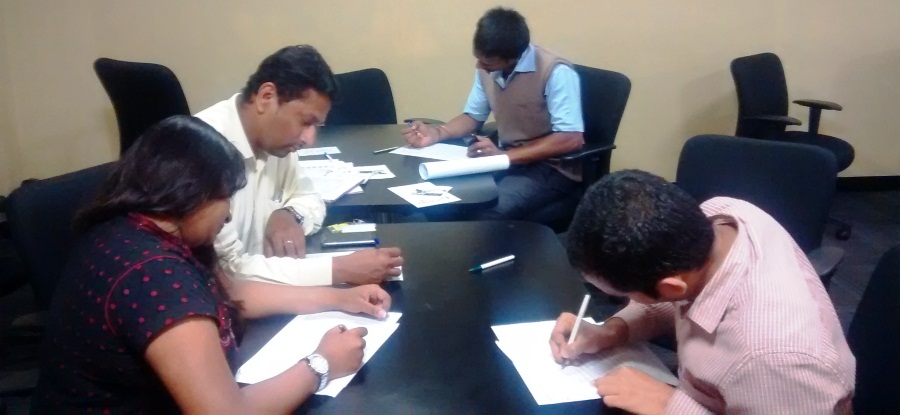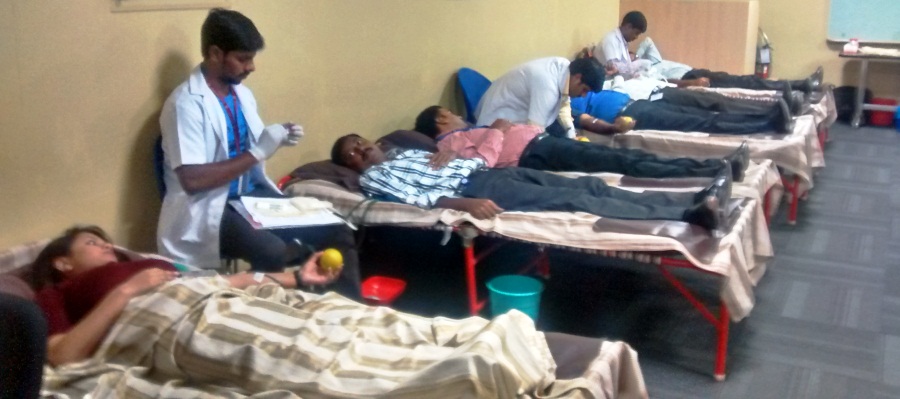Rakta Kranti's tryst with summer shortage
 Continuing with the momentum built up in May to organize more blood donation drives in the summer months, we had 19 blood donation drives in June 2015 leading to a collection of 2143 units. With the number of dengue cases having shot up quite significantly, these drives brought in some relief for people as more than 85% of these units were taken in for component separation to prepare platelets. Teams from Rashtrothana, Nimhans, Victoria, ESI, Bowring, Sanjay Gandhi, Narayana Hrudayalaya particpated in these events. CGI, who are one of the most regular and supportive organizations when it comes to working for blood donation drives allowed us to setup camps at their 3 locations on 3,4 June. As always there was a steady flow of donors throughout the day keeping the teams on their toes. 464 donors came out to donate and 373 units were collected. CGI's commitment to organize these drives every 6 months is quite commendable. Continuing with the series started in May, blood donation drives were organized across 4 more Wipro locations. Given the strength of the organisation it can be said that at some locations even a 2 day drive seems too little to accommodate donors. For example, at the EC45 location 592 units were collected by 4 blood banks over 2 days!. There was not a moment when the cots were free throughout the day. While 175 units were collected at the SJP location, 61 and 47 were collected at the other small setups at Pritech Park and Koramangala. Wipro's contribution and commitment to push for drives at all locations deserves applause. With 31 units at JLL, 69 units at Microchip, 16 units at Inteva, 27 units at Cox & Kings, 92 units at KPIT - where a drive was arranged on a short 3 day notice, we had many well known and supportive organizations playing their part in addressing the blood needs of the city. All of these organizations have been working with Sankalp for long enough and are an examples for regular commitment.
Continuing with the momentum built up in May to organize more blood donation drives in the summer months, we had 19 blood donation drives in June 2015 leading to a collection of 2143 units. With the number of dengue cases having shot up quite significantly, these drives brought in some relief for people as more than 85% of these units were taken in for component separation to prepare platelets. Teams from Rashtrothana, Nimhans, Victoria, ESI, Bowring, Sanjay Gandhi, Narayana Hrudayalaya particpated in these events. CGI, who are one of the most regular and supportive organizations when it comes to working for blood donation drives allowed us to setup camps at their 3 locations on 3,4 June. As always there was a steady flow of donors throughout the day keeping the teams on their toes. 464 donors came out to donate and 373 units were collected. CGI's commitment to organize these drives every 6 months is quite commendable. Continuing with the series started in May, blood donation drives were organized across 4 more Wipro locations. Given the strength of the organisation it can be said that at some locations even a 2 day drive seems too little to accommodate donors. For example, at the EC45 location 592 units were collected by 4 blood banks over 2 days!. There was not a moment when the cots were free throughout the day. While 175 units were collected at the SJP location, 61 and 47 were collected at the other small setups at Pritech Park and Koramangala. Wipro's contribution and commitment to push for drives at all locations deserves applause. With 31 units at JLL, 69 units at Microchip, 16 units at Inteva, 27 units at Cox & Kings, 92 units at KPIT - where a drive was arranged on a short 3 day notice, we had many well known and supportive organizations playing their part in addressing the blood needs of the city. All of these organizations have been working with Sankalp for long enough and are an examples for regular commitment. We also had 32 units at Spirit Gym in Raja Rajeshwarinagar and 65 units at JK Tech - both of whom are organisations where relationships were forged only in early June. Biocon and siter concern Syngene also organized blood donation drives in June. The publicity was excellent and there were times when one volunteer was only involved in processing forms and managing the crowd. More than 500 donors turned up and the camp at Syngene overflew to 2 days instead of just one. In all 420 units were collected here. Deutsche Bank, our friends who have helped us immensely in the fight against Thalassemia also accepted our request for a blood donation drive in June. 132 units were collected in a well organized drive With so many drives, the other numbers were slightly high as well. While he average percentage of adverse reactions has stabilized to about 3 per 100 donors, it was 3.6 in June. The NC per camp was also a bit higher than normal and stood at 1.63 per camp. Interestingly, the deferrals was just 10.5%. This is in stark contrast to the average of 20-22% in other months. This brings up an interesting question if the deferrals are driven by available stocks? Hopefully, with the new standards on deferrals - which is to be released in July will bring in more consistency,
We also had 32 units at Spirit Gym in Raja Rajeshwarinagar and 65 units at JK Tech - both of whom are organisations where relationships were forged only in early June. Biocon and siter concern Syngene also organized blood donation drives in June. The publicity was excellent and there were times when one volunteer was only involved in processing forms and managing the crowd. More than 500 donors turned up and the camp at Syngene overflew to 2 days instead of just one. In all 420 units were collected here. Deutsche Bank, our friends who have helped us immensely in the fight against Thalassemia also accepted our request for a blood donation drive in June. 132 units were collected in a well organized drive With so many drives, the other numbers were slightly high as well. While he average percentage of adverse reactions has stabilized to about 3 per 100 donors, it was 3.6 in June. The NC per camp was also a bit higher than normal and stood at 1.63 per camp. Interestingly, the deferrals was just 10.5%. This is in stark contrast to the average of 20-22% in other months. This brings up an interesting question if the deferrals are driven by available stocks? Hopefully, with the new standards on deferrals - which is to be released in July will bring in more consistency,
What's Up With Thalassemia in Sankalp
We had a total of 263 patient visits with 342 transfusions at Indira Gandhi Institute of Child Health Thalassemia Day Care in June 2015. On an average blood which was collected 4 days ago was transfused and it took 2 hours for the blood bank to process the blood components. The median pre-transfusion hemoglobin was 8.8 gm/dl. In house blood availability was a problem in June with several blood donation camps being cancelled at the last minute for the institute. Two out of every seven units which were issued were procured from other blood banks or donors were called to come and donate. Because of the difficulty in arranging for blood the median duration of stay in the hospital increased from about 6-7 hours to 8 hours. In addition to the management of thalassemia, the staff team at IGICH also involved in extended screening of the 16 families which have found a match for BMT. The preliminary tests are done with the intention of screening the families for any factors which may affect the transplant outcome. This screening also triggers a series of interventions aimed at preparing the child for transplant in the months to come. We had 197 patient visits with 248 transfusions at Samraksha, Rahstrotthana Parishat in June. Blood processing took 3.25 hours on an average and units which were transfused were on an average 4 days old. The median pre-transfusion hemoglobin was 8.8 gm/dl. All units of blood were made available within the blood bank though some appointments had to be postponed by a few days because of blood unavailability. Children spent an average of 7.25 hours for the transfusions in the day care. Samraksha staff has been exceptionally busy preparing the first few kids who will be undergoing BMT in Bangalore. The Sunday meetings with parents are also in full swing. June is usually the most difficult month when it comes to blood procurement because of universal shortage. However, even with all the struggle, the baseline hemoglobin's were preserved and things moved forward. From July we plan to restart the annual preventive tests starting with cardiac assessment and bone density measurements. We have also started using more of T2* MRI for the purpose of explaining the serum ferritin levels which do not correlate with the clinical condition and management. We also received several requests for antenatal screening which are being supported by the organisation. Screening relatives of thalassemia patients who at a risk of giving birth to a child with thalassemia is a priority for Sankalp and more antenatal requests from the families are a positive sign. This is a big change from the time when women came after carrying for more than 5 months and there was little that could be done except hope and pray that the child is not thalassemia major. More HLA typing was also done for the families who have a chance of benefiting from the transplants.
The helpline keeps ringing
We at Sankalp have our fingers on the pulse of blood stock availability in the state via our blood helpline. When the blood helpline rings day and night - every few minutes - it is an unmistakable indication that there is very little blood and people are struggling. June 2015, like all Junes in the past was a very difficult month when it came to availability of blood. We had the helpline receiving more than 100 calls on some days - most of which were frantic requests. We must mention that in the early part of the month, when there were most requests, the demand for platelets was very little. Most of the calls that were coming were for packed cells and whole blood. Though this changed at the weeks progressed and by the time the end of the month drew near - more and more platelets requests were coming to the helpline. Thanks to the Rakta Kranti Team for the daily blood donation camps which ensured that the supply of blood, during peak shortage, was maintained at least in the blood banks which cater to hospitals which contribute to a lion share of requests. We hope the situation eases out in July as colleges open and more people are available to donate blood. However, we must raise a red flag about the demand for platelets. We have heard callers ask for 2 units of single donor platelets - back to back. We have heard of platelets being demanded when the counts are more than 50,000. More and more requests for platelets are closer to being irrational.
